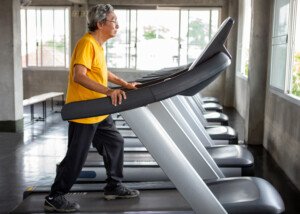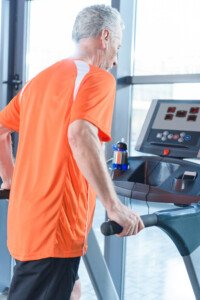
Hands off the treadmill is the first rule for men 65+ who are new to exercise.
This destructive habit is worse for seniors than young people. It could strain the hips and shoulders.
But even if it doesn’t strain those joints, it’s still a downgrade to the baseline walking that you do in day to day life.
Take a look at the two images of senior men here: One is holding onto the treadmill and one is not.
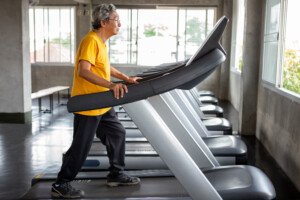
Shutterstock/ Iammotos
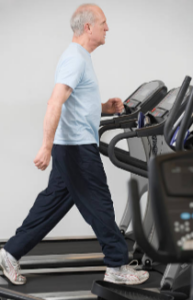
Which one looks like he’s getting a far more effective workout? This is a no-brainer.
- Which one has better posture?
- Which one looks more fluid and natural?
- Which one’s positioning looks like it will carry over better to the activities of daily living?
Look again at the image of the 65+ man who’s holding on. What can this possibly accomplish? This habit is driven by its popularity.
Benefits of Hands Free Walking on a Treadmill for Older People
“Falling is the number one cause of injury and mortality in the senior population, so exercises or activities that can improve balance and stability are very important,” says Dr. Tom Carpenter, corrective exercise specialist, certified personal trainer and chiropractor, inventor of Stand Corrected™, a portable harness-like stretching tool that helps alleviate back, neck and shoulder pain.
Dr. Carpenter continues, “Walking or jogging on a treadmill without holding on is an excellent way to do this, as it can improve proper posture and balance throughout the kinetic chain.
“It’s important, however, to make sure that the treadmill belt is wide enough (at least 20”) and long enough to provide a stable surface.”
Typical Scenario at the Gym
A man over 65 who’s new to the treadmill will look at all the other people at the gym on this machine, and notice that most of the walkers are holding on—even the younger ones.
When he sees even the 20-somethings holding on, he gets this idea that he, at age 65+, had better hold on.
He steps onto the machine, and the front bar or side rails are just beckoning him to grab them. And he does.
I’m going to be snarky here: “You call this walking?” Where’s the arm swing?
Holding onto the treadmill, even for men over 65, is bad because:
• The faster you “walk,” the more your hips will over-rotate, being used in a way that’s not natural, possibly leading to hip strain.
• The faster you “walk,” the tighter you’ll hold on, locking up your upper body even more, which can lead to shoulder strain.
• Slower walking will not solve these two problems.
• Holding on fails to mimic real life walking and will do zero to improve your balance and ambulation in real life living—where you don’t hold onto anything to walk.
• Tight grasping may increase blood pressure; not good.
• Holding on creates a deceptive sense of accomplishment; if you’ve been holding on at 10% incline at 3.5 mph, this makes you think you can walk hills outdoors effortlessly, when in fact, you’ll be exhausted within a few minutes.
• It deminishes your body’s balance mechanism.
• It mimics the use of a walker.
The rails and front bar are there for a heart rate check and for liability purposes (the manufacturer knows that there will always be someone who falls and sues).
IMPORTANT: This article pertains to those who do not need a walker or cane to get around in everyday life and who do not have visual impairment.
It’s funny, I see senior age men gripping the treadmill, and then they’ll get off and do walking lunges or leg presses!
However, walking lunges and leg presses will not cancel out the harm of holding onto a treadmill.
Can I add that it looks silly, too?
When I was a personal trainer for a large health club, I forbade my senior age clients from holding onto the machine.
None fell off. The posture of all improved. The gait of all, when off the treadmill, improved! How men 65+ can kick habit of treadmill holding.
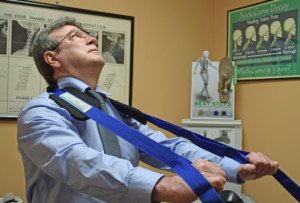
Photo credit: Aleesia Forni

